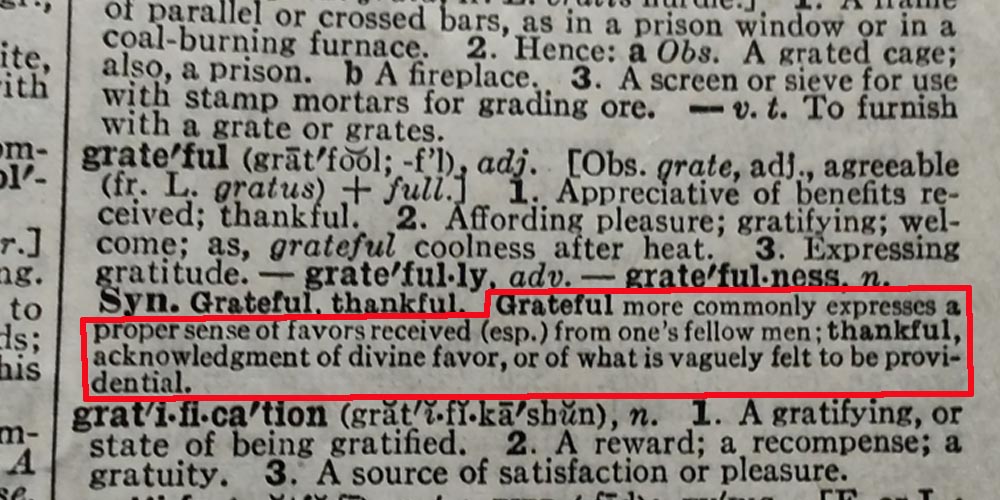On any given day if we delve deeply enough, some millennial somewhere is tweeting, blogging or Insta-influencing some word salad about how they are “so so GRATEFUL.” What on earth might one find problematic with this, you might ask.
Well, read on. But the short answer is, it is hypocrisy–plain and simple.
Sure, there may be some exceptions to my general observation and formed beliefs on this matter. But if the idea of this seems new or foreign to you, I challenge you to dig a little deeper into the subject and then, this holiday, as you are surrounded by any young people, put your listening ears on. Listen to how they talk about and enact the concept of their gratitude.
It is my belief that the millennials (at least the privileged, college-educated ones) may be the most ungrateful generation presently living.
Some readers will know exactly what I’m speaking about, while others may seem to have no real idea, for a variety of reasons.
If you don’t already know or don’t already see, I’m not so sure how I might open your eyes or persuade you over to recognizing this epidemic of faux-gratitude. Perhaps the best place to start is to define the difference between being thankful and being grateful.
While it would seem that the highly educated, highly privileged sub-population of millennials to which this post speaks would understand linguistical nuances, yet, they seem to not. Sure, they can routinely coin new buzzwords and phraseologies as tools to virtue signal, yet, many seem to lack a basic understanding of the historic meaning/implications of the word grateful.
Like many other words these days, the term has been hi-jacked to sound virtuous and moral, while the underbelly of what it now seems to mean is anything but virtuous and moral.
Maybe I should give more grace or space for those who do not distinguish between being thankful and being grateful, since while I may have always known there were slight differences in the implications of each word, it wasn’t until I heard a Thanksgiving sermon about ten years ago on the topic that I was able to both recognize and consciously articulate the distinction.
Even as I search online for the dictionary definitions, and, go into the old Webster’s dictionary that belonged to my mother and pre-dates the 1950’s, the two concepts aren’t as clearly defined and differentiated as I might have expected, perhaps. The closest hints I get at the difference between the two has to do with the listing of indebted as a synonym of grateful, and the idea of gratitude being “ready to show appreciation.”
As I now understand things, the concept of being thankful carries with it less depth and can even be appropriate to more short-lived situations. For example, a waitress brings our meal and we say, “thank you” rather than “I’m grateful to you.” We are thankful that we are at a restaurant enjoying good food, when others may not have basic food. But this transaction between the waitress, food preps and such and the end-user wouldn’t necessitate any lifelong obligation or particular respect (apart from the restaurant context) of any sort.
Grateful, however, carries with it a sense of future obligation, indebtedness or reciprocity. For example, historically, young people are taught to be grateful to their parents for their sacrifices and commitment to their well-being, upbringing, or simply, for the unique role of being their parent. We are grateful to grandparents for sharing their wisdom and their time; we owe respect to our elders, and we owe them our time, our care and our presence in a variety of ways, as they age.
It is the circle of life.
Biblically, it is the idea that to whom much is given, much will be expected. It has to do with honor and dishonor. I would go so far as to say that the amount of gratitude we show toward others is dependent on the soundness of, and our very relationship with and gratitude to, God Himself. We are not just “thankful” that Jesus completely laid down His life for us in suffering and enduring the Cross, but we are eternally grateful. We owe Him our very life; and we owe the Creator all that we are–not out of mere thankfulness at existing–but gratitude that we have been given Life itself.
I speak here in hopes that this writing will somehow be used by God in this horrific spiritual war that is being waged against the family–with its deconstruction/destruction the goal. I recently listened to a good audiobook called Live Not By Lies. I encourage others to listen and to get ideas how we can push back against the forces of lies infiltrating the minds and hearts of both young and old in our nation and in our world.
It can be challenging and frightening to speak up–to openly say that in many cases there is a usage of the word grateful these days that belies the truth of what the word means. In a sense, it is “like” what we are warned against in I Timothy 3. If I were to re-contextualize this thought, I would say that many today are holding a “form” of gratitude but denying its power.
Live not by this lie.





Thank You For Reading
Please Feel Free To Express Your Thoughts Below




